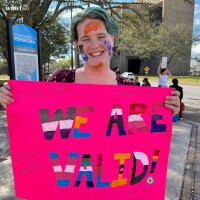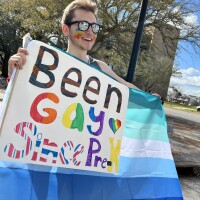In the week after the Florida Legislature passed the Parental Rights in Education bill, widely known as the “Don’t Say Gay” bill, protests have broken out across the state. On social media, students have shared videos of their walkouts from schools. Earlier this week, a group of about 50 students protested outside Fort Walton Beach High School.
Wednesday afternoon in Pensacola, dozens gathered outside the Escambia County Courthouse with signs and music to express their concerns with the bill.
“I just think this whole bill is kind of ridiculous,” said Ashely Tucker, a junior at UWF majoring in elementary education.
With a rainbow flag tucked into her hair, Tucker waved a sign that read “I will be an ally to my students.” She’s studying elementary education and she says the bill does more to hurt students than help.
“It kind of keeps kids in the closet,” she added. “They should have free speech and be able to say what they are and who they are and what they identify as and not just be restricted by a bill. Because I don’t think that is what this world should be. Especially kids who’re trying to figure out life. They’re going to grow up with these influences and if these influences can’t be true and honest with them then what’s the point?”

Tucker said the bill has made her rethink post-graduation plans.
“Honestly, I’ve thought of leaving Florida,” she said. “Maybe going to another country and teaching abroad. I would like to teach here and change future children’s lives.”
The bill in question was one of the hotly debated pieces of legislation among Florida lawmakers. The measure prohibits “classroom instruction by school personnel or third parties on sexual orientation or gender identity” in kindergarten through third grade. It also prohibits such teaching “in a manner that is not age-appropriate or developmentally appropriate for students” in addition to banning school districts from adopting procedures that would “prohibit school personnel from notifying parents about specified information or encourage a student to withhold from parent such information.”
Supporters of the bill said it allows for parents to have control over their children’s education, but some critics say the language is written too broadly and puts students at risk.
“Teachers are sometimes the only people kids can go to who they trust,” said Julia Moehle “To take that away from children — that’s absolutely terrible.”
Julia and her sister, Alex, organized Wednesday’s protest by getting the word out online. Dozens of people showed up throughout the afternoon to lend their voices.
“I saw a lot about it on TikTok and read about it and was upset about it,” said Alex. “I really want to do something about it because I’m just tired of sitting on the sidelines.”
Alex calls herself mom to a handful of young LGBTQ+ kids online who lack support at home or in their community. She says she hears from students who are afraid to come out at home because they’ve been threatened by parents.
“This (bill) doesn’t protect anybody,” she said. “It puts them in danger.”
And she’s worried that not enough people are aware of the bill. Which is why she wanted to protest.

“A lot of the people I’ve talked to who either don’t have kids that age or don’t have kids at all or have adult kids don’t even know that this is happening,” said Alex. “I really want people to be aware that’s it happening and to let their congressmen, their senators, let everybody know we don’t want this. We don’t want this, we don’t like this and I don’t care if you’re bigoted you don’t get to act this way.”
Schools have been the hub for culture wars, not just in Florida, with bills that center on banned books and how racism is taught. Sexuality and gender identity are other hot topics.
“What people are not understanding is that we are not trying to get teachers to teach young children about sex because sexuality is not about sex. Sexuality is (about saying) it’s OK if you love the same gender, it’s OK if you’re non-binary, it’s OK if you’re trans.”
At the rally, Austin Scott held a sign that read “Been Gay Since Pre-K.”
“Since this bill states that kindergarteners and first- and second-graders shouldn’t know anything about being gay, I wanted people to know that I’ve been gay since pre-k so it’s OK that they talk about being gay,” he said. “Because they are gay since birth.”
Scott said he thought the bill was simply “pretty awful and disgusting.”
“The LGBTQ community needs support and this bill is directly hurting them horribly,” he said. “I don’t understand why they would ever make it.”

The response from passersby was largely positive with plenty of waves and friendly honks.
The ACLU of Florida is collecting stories from individuals who have been or could be impacted by the bill. On the local level, Strive, an advocacy and organizing group centered on the needs of transgender people in Escambia County, said they are working to help amplify kids’ voices.
“Moving forward, going to be connecting with Julia doing a follow-up speak out where we center queer and trans kids,” said President Devin Cole during a Zoom meeting with Strive members Wednesday night. “These kids do have opinions, these kids have something to say and we need to listen. It wasn’t too long ago we were these kids.”
“This will likely end up in court,” Cole added “But it could, in theory, take the entirety of a school year —that is not something we should be counting out. Let’s not sit back and wait on that.”
Alex said she’s encouraged to keep protesting and keep advocating. And she hopes students are watching.
“I want them to know there are adults who do care; there are people who will support them and will do whatever it takes to help them,” she said. “Those are my kids, too. They might not be my biological kids, they might not be my adopted kids but those are my kids and I protect them, period.”


